Political Economy: Examining Homelessness in Canada and Solutions
VerifiedAdded on 2020/04/13
|12
|2883
|225
Report
AI Summary
This report examines the pressing issue of homelessness in Canada from a political economy perspective. It explores the degree and causes of homelessness, including poverty, lack of affordable housing, immigration, and substance abuse. The report delves into the legal framework surrounding the right to adequate housing in Canada, analyzing the government's role and market forces. It also discusses potential measures to prevent homelessness, such as limiting foreign land ownership, restricting tax evasion, and implementing a 'housing first' strategy. The analysis highlights the complex interplay of economic, social, and political factors contributing to the crisis and proposes actionable strategies for addressing this critical social challenge. The report emphasizes the need for a multi-faceted approach involving government intervention, market adjustments, and legal reforms to ensure adequate housing for all residents.
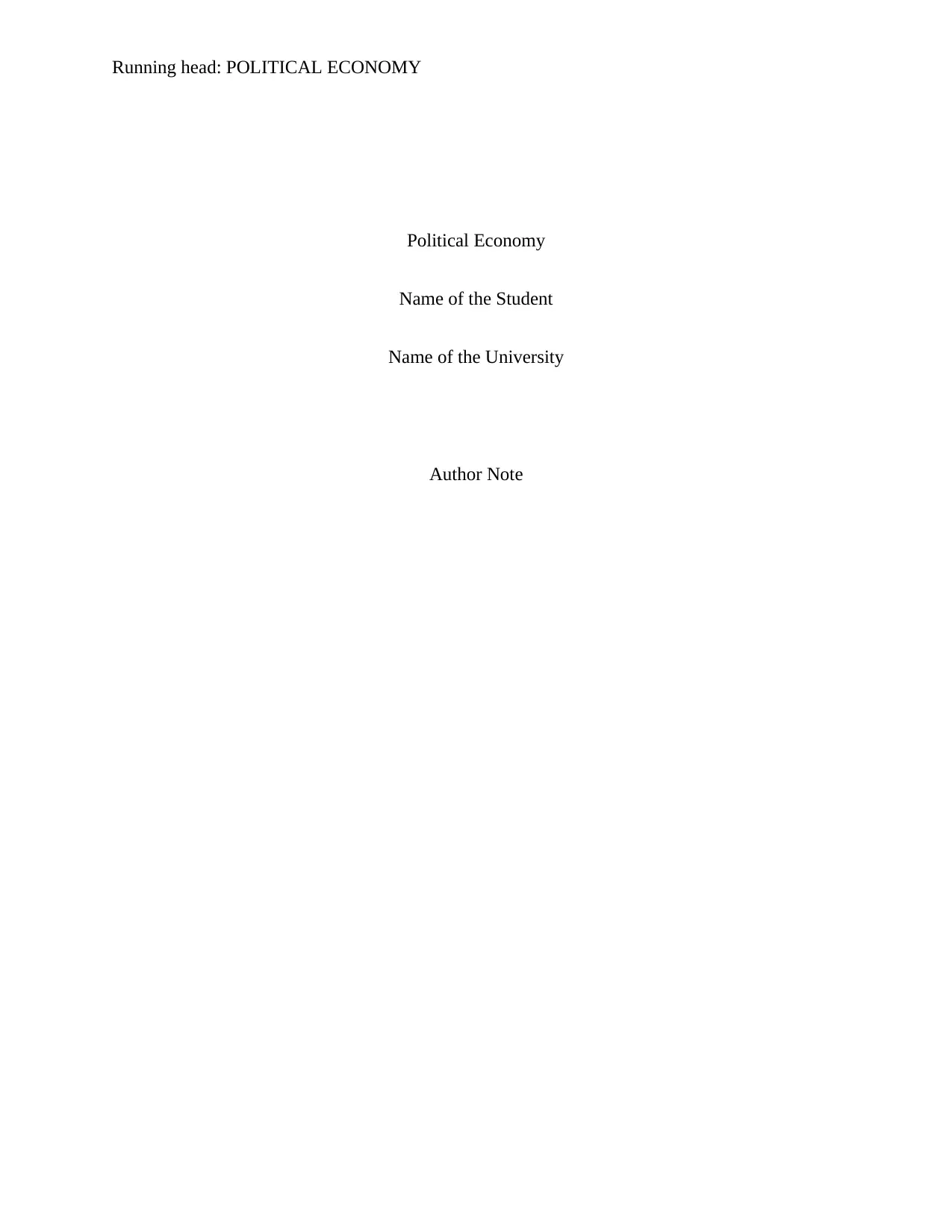
Running head: POLITICAL ECONOMY
Political Economy
Name of the Student
Name of the University
Author Note
Political Economy
Name of the Student
Name of the University
Author Note
Paraphrase This Document
Need a fresh take? Get an instant paraphrase of this document with our AI Paraphraser
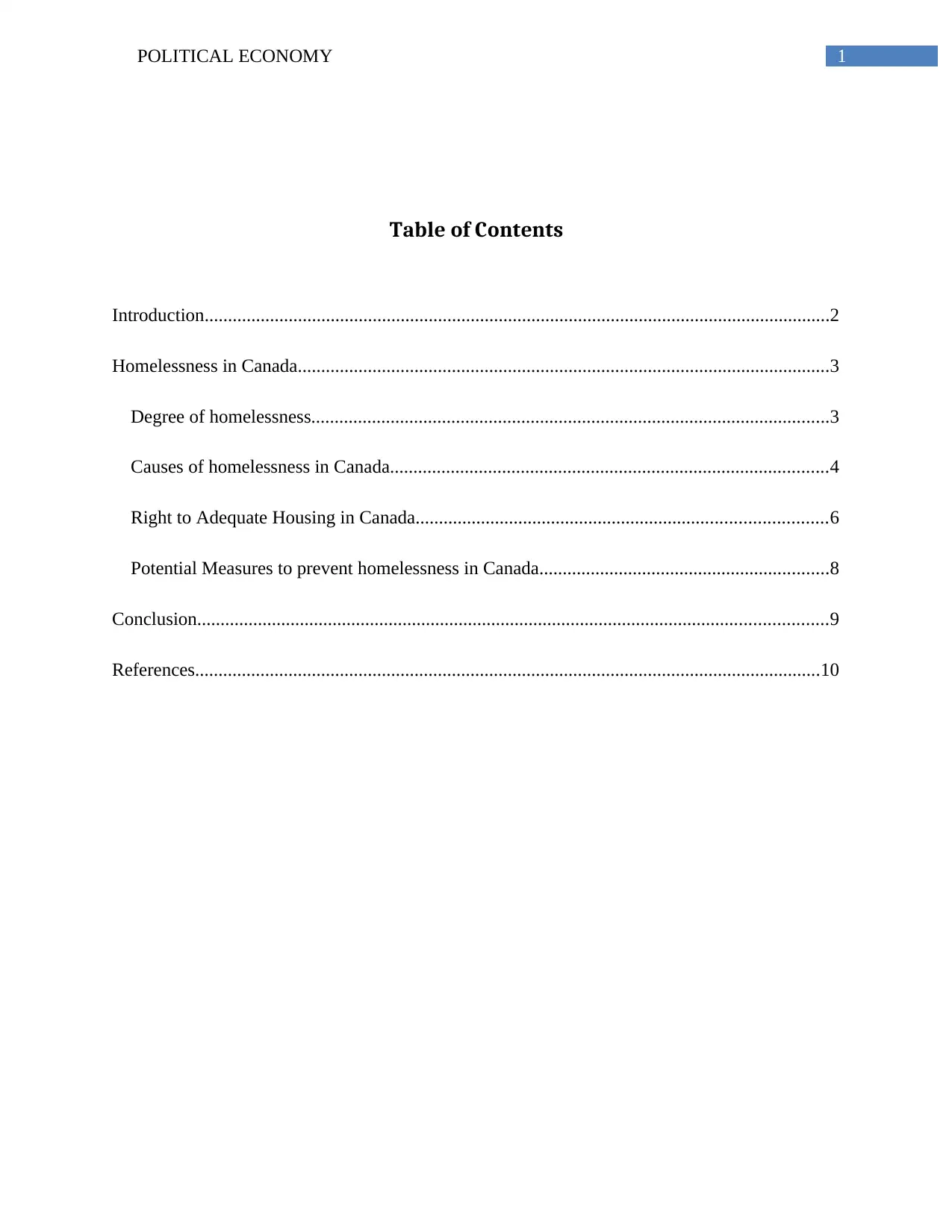
1POLITICAL ECONOMY
Table of Contents
Introduction......................................................................................................................................2
Homelessness in Canada..................................................................................................................3
Degree of homelessness...............................................................................................................3
Causes of homelessness in Canada..............................................................................................4
Right to Adequate Housing in Canada........................................................................................6
Potential Measures to prevent homelessness in Canada..............................................................8
Conclusion.......................................................................................................................................9
References......................................................................................................................................10
Table of Contents
Introduction......................................................................................................................................2
Homelessness in Canada..................................................................................................................3
Degree of homelessness...............................................................................................................3
Causes of homelessness in Canada..............................................................................................4
Right to Adequate Housing in Canada........................................................................................6
Potential Measures to prevent homelessness in Canada..............................................................8
Conclusion.......................................................................................................................................9
References......................................................................................................................................10
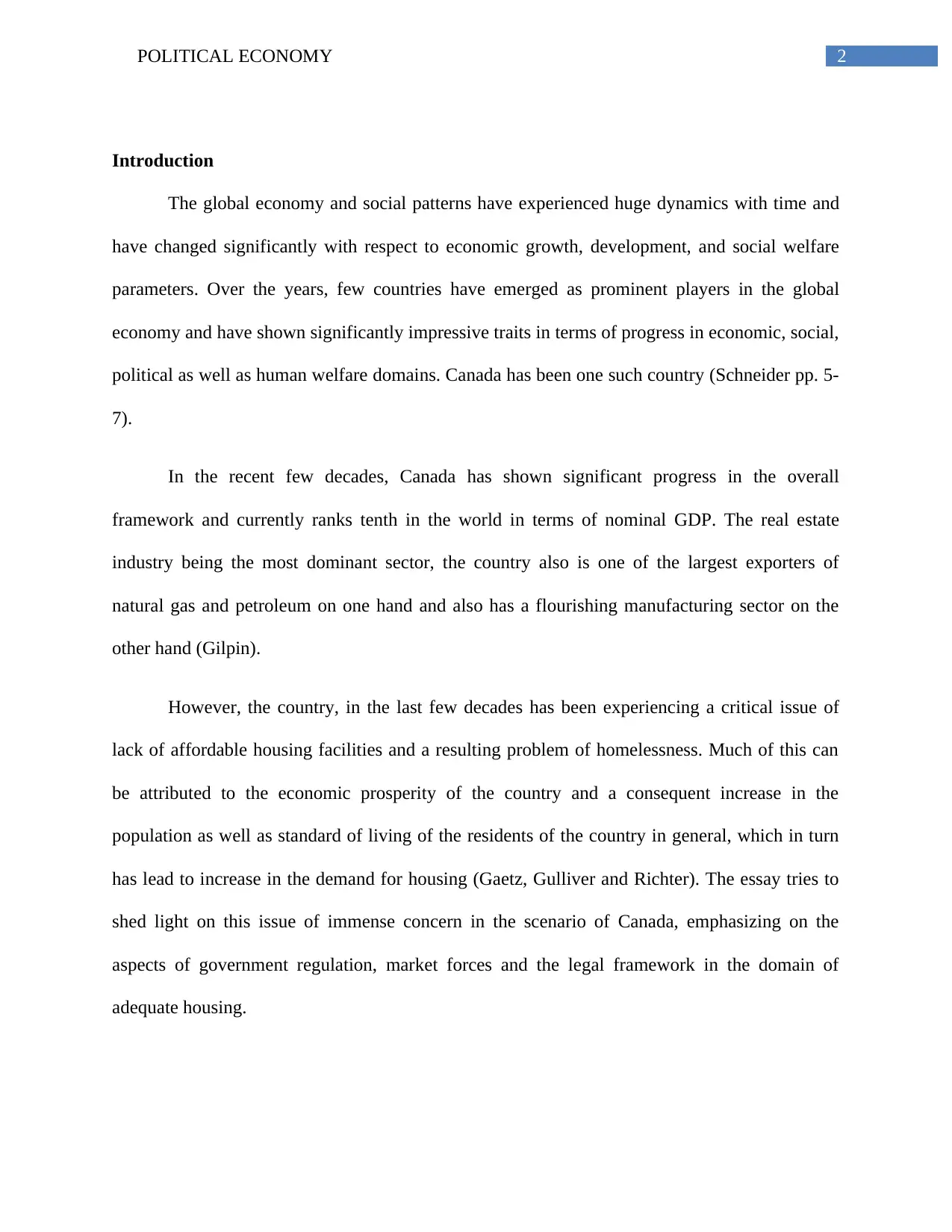
2POLITICAL ECONOMY
Introduction
The global economy and social patterns have experienced huge dynamics with time and
have changed significantly with respect to economic growth, development, and social welfare
parameters. Over the years, few countries have emerged as prominent players in the global
economy and have shown significantly impressive traits in terms of progress in economic, social,
political as well as human welfare domains. Canada has been one such country (Schneider pp. 5-
7).
In the recent few decades, Canada has shown significant progress in the overall
framework and currently ranks tenth in the world in terms of nominal GDP. The real estate
industry being the most dominant sector, the country also is one of the largest exporters of
natural gas and petroleum on one hand and also has a flourishing manufacturing sector on the
other hand (Gilpin).
However, the country, in the last few decades has been experiencing a critical issue of
lack of affordable housing facilities and a resulting problem of homelessness. Much of this can
be attributed to the economic prosperity of the country and a consequent increase in the
population as well as standard of living of the residents of the country in general, which in turn
has lead to increase in the demand for housing (Gaetz, Gulliver and Richter). The essay tries to
shed light on this issue of immense concern in the scenario of Canada, emphasizing on the
aspects of government regulation, market forces and the legal framework in the domain of
adequate housing.
Introduction
The global economy and social patterns have experienced huge dynamics with time and
have changed significantly with respect to economic growth, development, and social welfare
parameters. Over the years, few countries have emerged as prominent players in the global
economy and have shown significantly impressive traits in terms of progress in economic, social,
political as well as human welfare domains. Canada has been one such country (Schneider pp. 5-
7).
In the recent few decades, Canada has shown significant progress in the overall
framework and currently ranks tenth in the world in terms of nominal GDP. The real estate
industry being the most dominant sector, the country also is one of the largest exporters of
natural gas and petroleum on one hand and also has a flourishing manufacturing sector on the
other hand (Gilpin).
However, the country, in the last few decades has been experiencing a critical issue of
lack of affordable housing facilities and a resulting problem of homelessness. Much of this can
be attributed to the economic prosperity of the country and a consequent increase in the
population as well as standard of living of the residents of the country in general, which in turn
has lead to increase in the demand for housing (Gaetz, Gulliver and Richter). The essay tries to
shed light on this issue of immense concern in the scenario of Canada, emphasizing on the
aspects of government regulation, market forces and the legal framework in the domain of
adequate housing.
⊘ This is a preview!⊘
Do you want full access?
Subscribe today to unlock all pages.

Trusted by 1+ million students worldwide
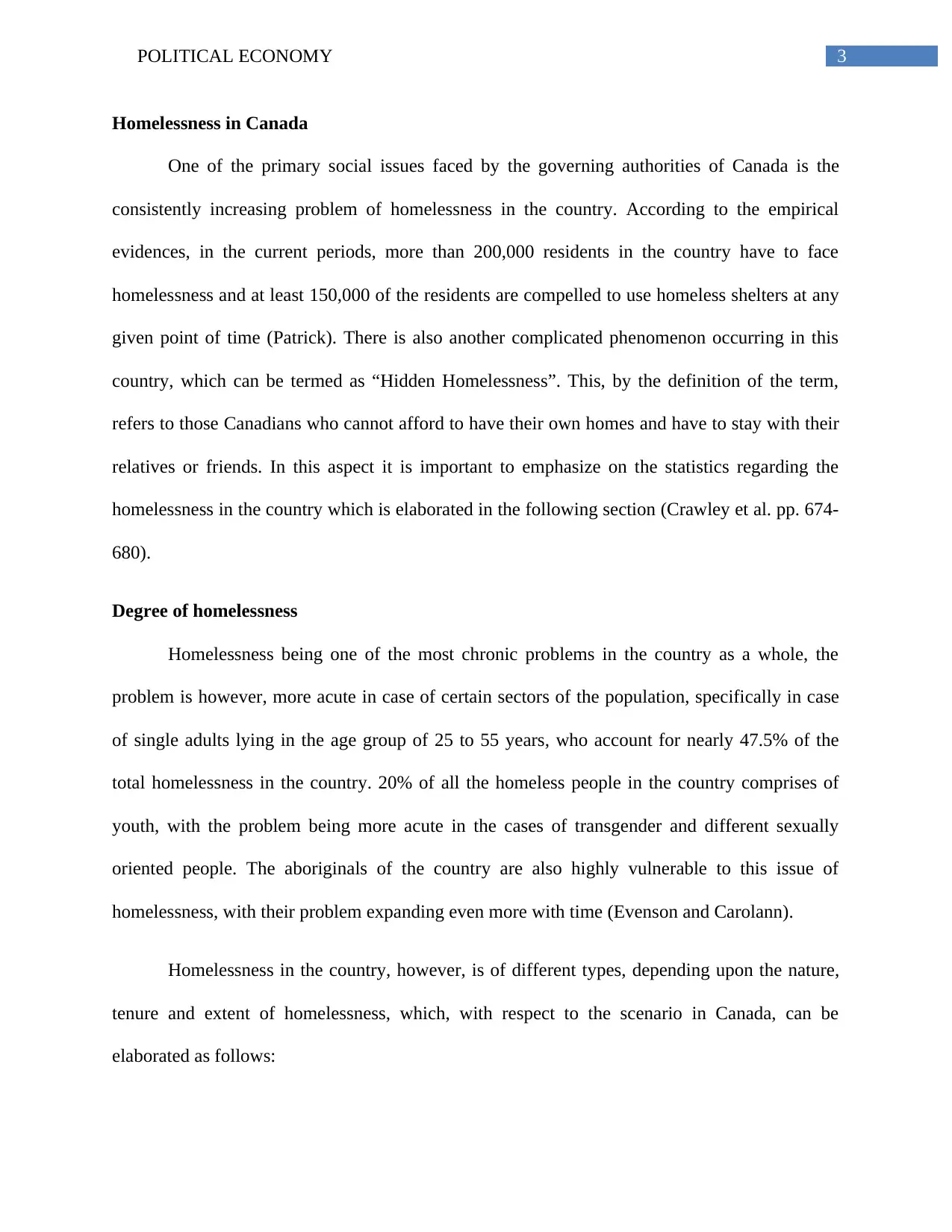
3POLITICAL ECONOMY
Homelessness in Canada
One of the primary social issues faced by the governing authorities of Canada is the
consistently increasing problem of homelessness in the country. According to the empirical
evidences, in the current periods, more than 200,000 residents in the country have to face
homelessness and at least 150,000 of the residents are compelled to use homeless shelters at any
given point of time (Patrick). There is also another complicated phenomenon occurring in this
country, which can be termed as “Hidden Homelessness”. This, by the definition of the term,
refers to those Canadians who cannot afford to have their own homes and have to stay with their
relatives or friends. In this aspect it is important to emphasize on the statistics regarding the
homelessness in the country which is elaborated in the following section (Crawley et al. pp. 674-
680).
Degree of homelessness
Homelessness being one of the most chronic problems in the country as a whole, the
problem is however, more acute in case of certain sectors of the population, specifically in case
of single adults lying in the age group of 25 to 55 years, who account for nearly 47.5% of the
total homelessness in the country. 20% of all the homeless people in the country comprises of
youth, with the problem being more acute in the cases of transgender and different sexually
oriented people. The aboriginals of the country are also highly vulnerable to this issue of
homelessness, with their problem expanding even more with time (Evenson and Carolann).
Homelessness in the country, however, is of different types, depending upon the nature,
tenure and extent of homelessness, which, with respect to the scenario in Canada, can be
elaborated as follows:
Homelessness in Canada
One of the primary social issues faced by the governing authorities of Canada is the
consistently increasing problem of homelessness in the country. According to the empirical
evidences, in the current periods, more than 200,000 residents in the country have to face
homelessness and at least 150,000 of the residents are compelled to use homeless shelters at any
given point of time (Patrick). There is also another complicated phenomenon occurring in this
country, which can be termed as “Hidden Homelessness”. This, by the definition of the term,
refers to those Canadians who cannot afford to have their own homes and have to stay with their
relatives or friends. In this aspect it is important to emphasize on the statistics regarding the
homelessness in the country which is elaborated in the following section (Crawley et al. pp. 674-
680).
Degree of homelessness
Homelessness being one of the most chronic problems in the country as a whole, the
problem is however, more acute in case of certain sectors of the population, specifically in case
of single adults lying in the age group of 25 to 55 years, who account for nearly 47.5% of the
total homelessness in the country. 20% of all the homeless people in the country comprises of
youth, with the problem being more acute in the cases of transgender and different sexually
oriented people. The aboriginals of the country are also highly vulnerable to this issue of
homelessness, with their problem expanding even more with time (Evenson and Carolann).
Homelessness in the country, however, is of different types, depending upon the nature,
tenure and extent of homelessness, which, with respect to the scenario in Canada, can be
elaborated as follows:
Paraphrase This Document
Need a fresh take? Get an instant paraphrase of this document with our AI Paraphraser
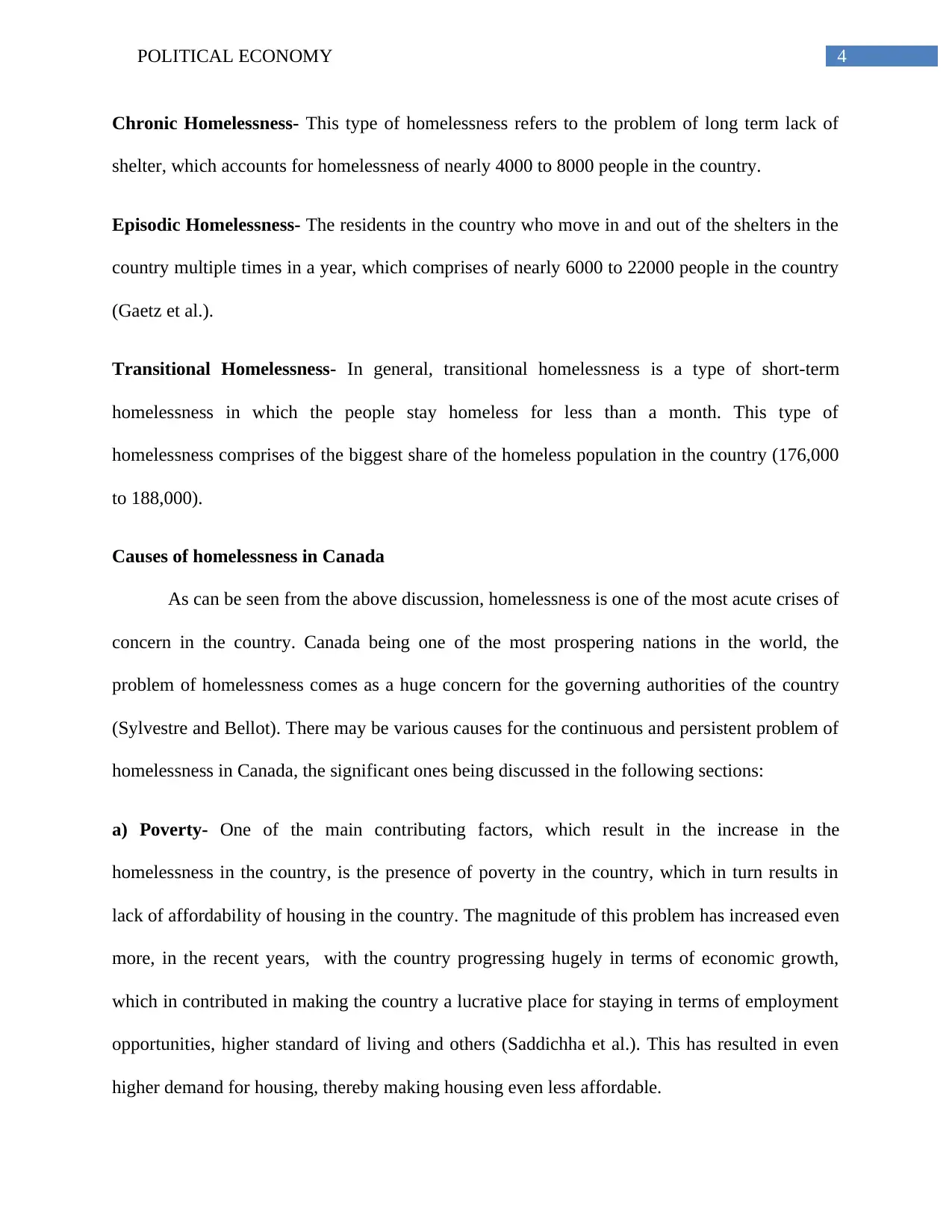
4POLITICAL ECONOMY
Chronic Homelessness- This type of homelessness refers to the problem of long term lack of
shelter, which accounts for homelessness of nearly 4000 to 8000 people in the country.
Episodic Homelessness- The residents in the country who move in and out of the shelters in the
country multiple times in a year, which comprises of nearly 6000 to 22000 people in the country
(Gaetz et al.).
Transitional Homelessness- In general, transitional homelessness is a type of short-term
homelessness in which the people stay homeless for less than a month. This type of
homelessness comprises of the biggest share of the homeless population in the country (176,000
to 188,000).
Causes of homelessness in Canada
As can be seen from the above discussion, homelessness is one of the most acute crises of
concern in the country. Canada being one of the most prospering nations in the world, the
problem of homelessness comes as a huge concern for the governing authorities of the country
(Sylvestre and Bellot). There may be various causes for the continuous and persistent problem of
homelessness in Canada, the significant ones being discussed in the following sections:
a) Poverty- One of the main contributing factors, which result in the increase in the
homelessness in the country, is the presence of poverty in the country, which in turn results in
lack of affordability of housing in the country. The magnitude of this problem has increased even
more, in the recent years, with the country progressing hugely in terms of economic growth,
which in contributed in making the country a lucrative place for staying in terms of employment
opportunities, higher standard of living and others (Saddichha et al.). This has resulted in even
higher demand for housing, thereby making housing even less affordable.
Chronic Homelessness- This type of homelessness refers to the problem of long term lack of
shelter, which accounts for homelessness of nearly 4000 to 8000 people in the country.
Episodic Homelessness- The residents in the country who move in and out of the shelters in the
country multiple times in a year, which comprises of nearly 6000 to 22000 people in the country
(Gaetz et al.).
Transitional Homelessness- In general, transitional homelessness is a type of short-term
homelessness in which the people stay homeless for less than a month. This type of
homelessness comprises of the biggest share of the homeless population in the country (176,000
to 188,000).
Causes of homelessness in Canada
As can be seen from the above discussion, homelessness is one of the most acute crises of
concern in the country. Canada being one of the most prospering nations in the world, the
problem of homelessness comes as a huge concern for the governing authorities of the country
(Sylvestre and Bellot). There may be various causes for the continuous and persistent problem of
homelessness in Canada, the significant ones being discussed in the following sections:
a) Poverty- One of the main contributing factors, which result in the increase in the
homelessness in the country, is the presence of poverty in the country, which in turn results in
lack of affordability of housing in the country. The magnitude of this problem has increased even
more, in the recent years, with the country progressing hugely in terms of economic growth,
which in contributed in making the country a lucrative place for staying in terms of employment
opportunities, higher standard of living and others (Saddichha et al.). This has resulted in even
higher demand for housing, thereby making housing even less affordable.
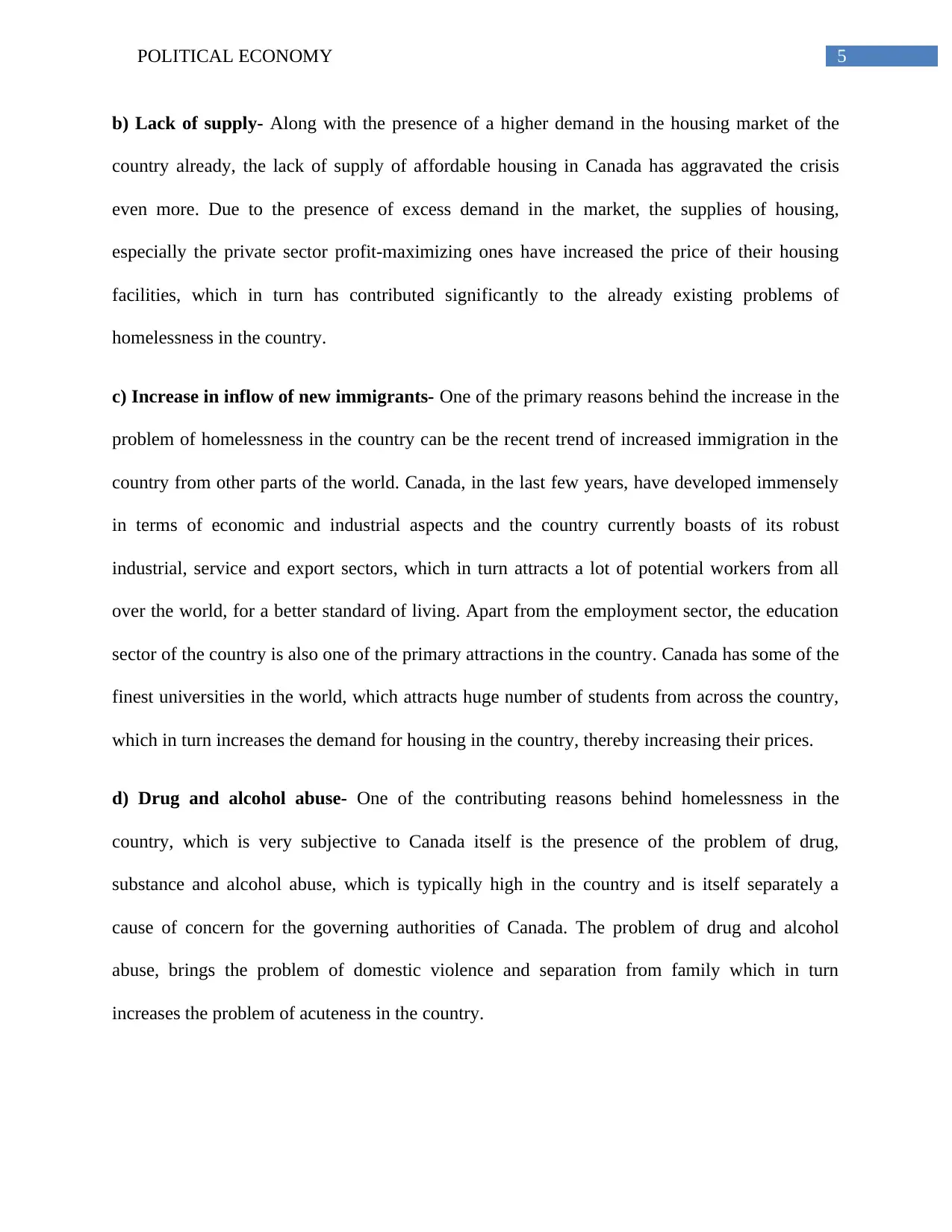
5POLITICAL ECONOMY
b) Lack of supply- Along with the presence of a higher demand in the housing market of the
country already, the lack of supply of affordable housing in Canada has aggravated the crisis
even more. Due to the presence of excess demand in the market, the supplies of housing,
especially the private sector profit-maximizing ones have increased the price of their housing
facilities, which in turn has contributed significantly to the already existing problems of
homelessness in the country.
c) Increase in inflow of new immigrants- One of the primary reasons behind the increase in the
problem of homelessness in the country can be the recent trend of increased immigration in the
country from other parts of the world. Canada, in the last few years, have developed immensely
in terms of economic and industrial aspects and the country currently boasts of its robust
industrial, service and export sectors, which in turn attracts a lot of potential workers from all
over the world, for a better standard of living. Apart from the employment sector, the education
sector of the country is also one of the primary attractions in the country. Canada has some of the
finest universities in the world, which attracts huge number of students from across the country,
which in turn increases the demand for housing in the country, thereby increasing their prices.
d) Drug and alcohol abuse- One of the contributing reasons behind homelessness in the
country, which is very subjective to Canada itself is the presence of the problem of drug,
substance and alcohol abuse, which is typically high in the country and is itself separately a
cause of concern for the governing authorities of Canada. The problem of drug and alcohol
abuse, brings the problem of domestic violence and separation from family which in turn
increases the problem of acuteness in the country.
b) Lack of supply- Along with the presence of a higher demand in the housing market of the
country already, the lack of supply of affordable housing in Canada has aggravated the crisis
even more. Due to the presence of excess demand in the market, the supplies of housing,
especially the private sector profit-maximizing ones have increased the price of their housing
facilities, which in turn has contributed significantly to the already existing problems of
homelessness in the country.
c) Increase in inflow of new immigrants- One of the primary reasons behind the increase in the
problem of homelessness in the country can be the recent trend of increased immigration in the
country from other parts of the world. Canada, in the last few years, have developed immensely
in terms of economic and industrial aspects and the country currently boasts of its robust
industrial, service and export sectors, which in turn attracts a lot of potential workers from all
over the world, for a better standard of living. Apart from the employment sector, the education
sector of the country is also one of the primary attractions in the country. Canada has some of the
finest universities in the world, which attracts huge number of students from across the country,
which in turn increases the demand for housing in the country, thereby increasing their prices.
d) Drug and alcohol abuse- One of the contributing reasons behind homelessness in the
country, which is very subjective to Canada itself is the presence of the problem of drug,
substance and alcohol abuse, which is typically high in the country and is itself separately a
cause of concern for the governing authorities of Canada. The problem of drug and alcohol
abuse, brings the problem of domestic violence and separation from family which in turn
increases the problem of acuteness in the country.
⊘ This is a preview!⊘
Do you want full access?
Subscribe today to unlock all pages.

Trusted by 1+ million students worldwide
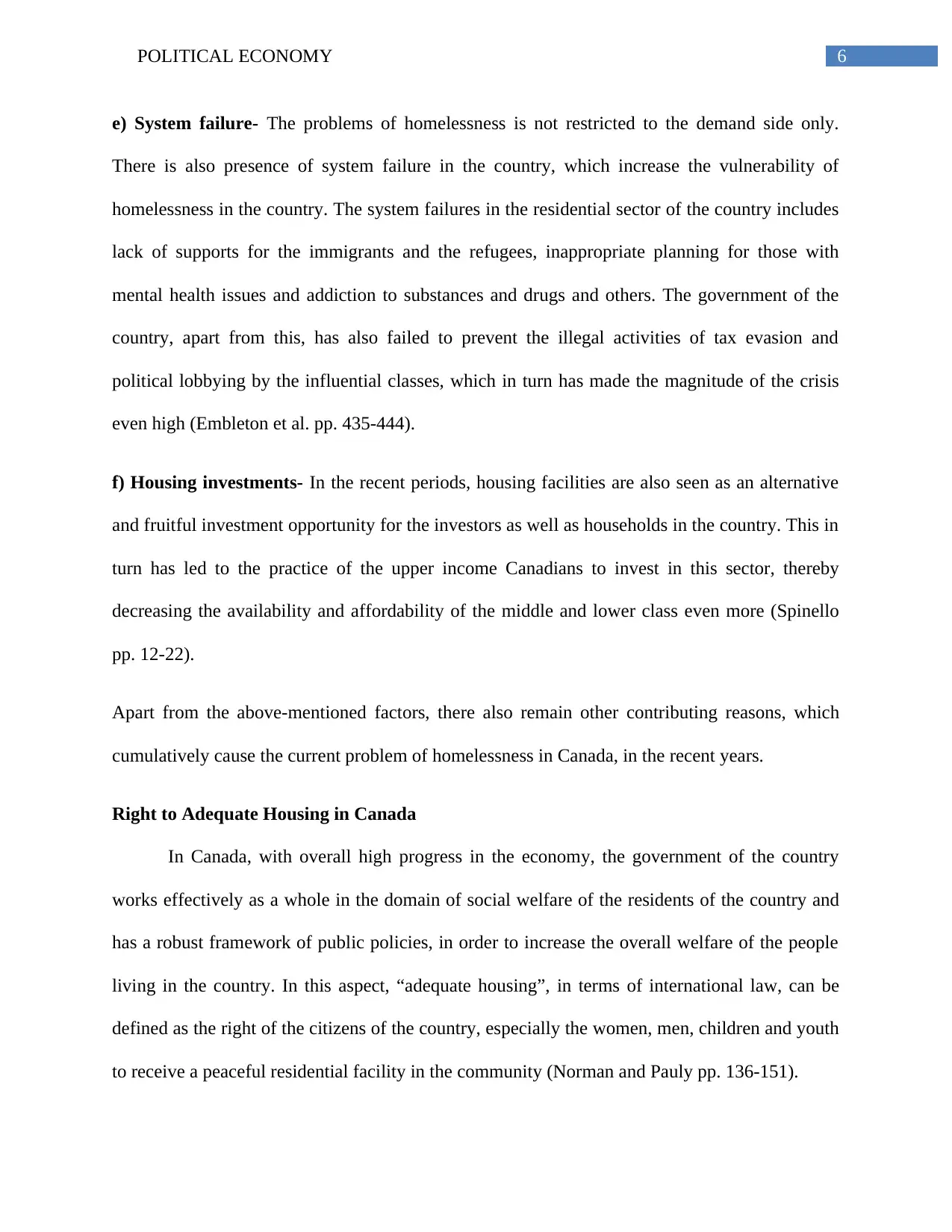
6POLITICAL ECONOMY
e) System failure- The problems of homelessness is not restricted to the demand side only.
There is also presence of system failure in the country, which increase the vulnerability of
homelessness in the country. The system failures in the residential sector of the country includes
lack of supports for the immigrants and the refugees, inappropriate planning for those with
mental health issues and addiction to substances and drugs and others. The government of the
country, apart from this, has also failed to prevent the illegal activities of tax evasion and
political lobbying by the influential classes, which in turn has made the magnitude of the crisis
even high (Embleton et al. pp. 435-444).
f) Housing investments- In the recent periods, housing facilities are also seen as an alternative
and fruitful investment opportunity for the investors as well as households in the country. This in
turn has led to the practice of the upper income Canadians to invest in this sector, thereby
decreasing the availability and affordability of the middle and lower class even more (Spinello
pp. 12-22).
Apart from the above-mentioned factors, there also remain other contributing reasons, which
cumulatively cause the current problem of homelessness in Canada, in the recent years.
Right to Adequate Housing in Canada
In Canada, with overall high progress in the economy, the government of the country
works effectively as a whole in the domain of social welfare of the residents of the country and
has a robust framework of public policies, in order to increase the overall welfare of the people
living in the country. In this aspect, “adequate housing”, in terms of international law, can be
defined as the right of the citizens of the country, especially the women, men, children and youth
to receive a peaceful residential facility in the community (Norman and Pauly pp. 136-151).
e) System failure- The problems of homelessness is not restricted to the demand side only.
There is also presence of system failure in the country, which increase the vulnerability of
homelessness in the country. The system failures in the residential sector of the country includes
lack of supports for the immigrants and the refugees, inappropriate planning for those with
mental health issues and addiction to substances and drugs and others. The government of the
country, apart from this, has also failed to prevent the illegal activities of tax evasion and
political lobbying by the influential classes, which in turn has made the magnitude of the crisis
even high (Embleton et al. pp. 435-444).
f) Housing investments- In the recent periods, housing facilities are also seen as an alternative
and fruitful investment opportunity for the investors as well as households in the country. This in
turn has led to the practice of the upper income Canadians to invest in this sector, thereby
decreasing the availability and affordability of the middle and lower class even more (Spinello
pp. 12-22).
Apart from the above-mentioned factors, there also remain other contributing reasons, which
cumulatively cause the current problem of homelessness in Canada, in the recent years.
Right to Adequate Housing in Canada
In Canada, with overall high progress in the economy, the government of the country
works effectively as a whole in the domain of social welfare of the residents of the country and
has a robust framework of public policies, in order to increase the overall welfare of the people
living in the country. In this aspect, “adequate housing”, in terms of international law, can be
defined as the right of the citizens of the country, especially the women, men, children and youth
to receive a peaceful residential facility in the community (Norman and Pauly pp. 136-151).
Paraphrase This Document
Need a fresh take? Get an instant paraphrase of this document with our AI Paraphraser
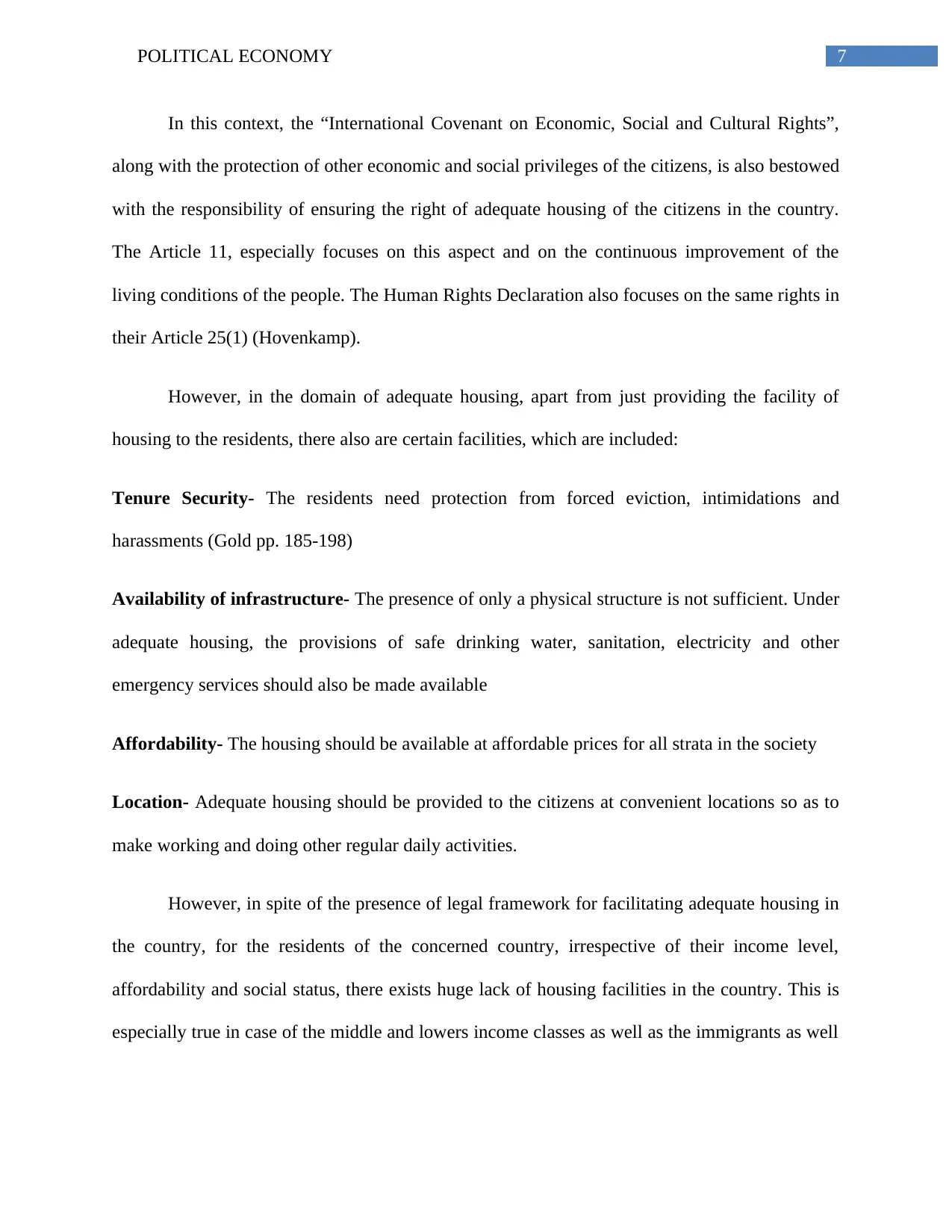
7POLITICAL ECONOMY
In this context, the “International Covenant on Economic, Social and Cultural Rights”,
along with the protection of other economic and social privileges of the citizens, is also bestowed
with the responsibility of ensuring the right of adequate housing of the citizens in the country.
The Article 11, especially focuses on this aspect and on the continuous improvement of the
living conditions of the people. The Human Rights Declaration also focuses on the same rights in
their Article 25(1) (Hovenkamp).
However, in the domain of adequate housing, apart from just providing the facility of
housing to the residents, there also are certain facilities, which are included:
Tenure Security- The residents need protection from forced eviction, intimidations and
harassments (Gold pp. 185-198)
Availability of infrastructure- The presence of only a physical structure is not sufficient. Under
adequate housing, the provisions of safe drinking water, sanitation, electricity and other
emergency services should also be made available
Affordability- The housing should be available at affordable prices for all strata in the society
Location- Adequate housing should be provided to the citizens at convenient locations so as to
make working and doing other regular daily activities.
However, in spite of the presence of legal framework for facilitating adequate housing in
the country, for the residents of the concerned country, irrespective of their income level,
affordability and social status, there exists huge lack of housing facilities in the country. This is
especially true in case of the middle and lowers income classes as well as the immigrants as well
In this context, the “International Covenant on Economic, Social and Cultural Rights”,
along with the protection of other economic and social privileges of the citizens, is also bestowed
with the responsibility of ensuring the right of adequate housing of the citizens in the country.
The Article 11, especially focuses on this aspect and on the continuous improvement of the
living conditions of the people. The Human Rights Declaration also focuses on the same rights in
their Article 25(1) (Hovenkamp).
However, in the domain of adequate housing, apart from just providing the facility of
housing to the residents, there also are certain facilities, which are included:
Tenure Security- The residents need protection from forced eviction, intimidations and
harassments (Gold pp. 185-198)
Availability of infrastructure- The presence of only a physical structure is not sufficient. Under
adequate housing, the provisions of safe drinking water, sanitation, electricity and other
emergency services should also be made available
Affordability- The housing should be available at affordable prices for all strata in the society
Location- Adequate housing should be provided to the citizens at convenient locations so as to
make working and doing other regular daily activities.
However, in spite of the presence of legal framework for facilitating adequate housing in
the country, for the residents of the concerned country, irrespective of their income level,
affordability and social status, there exists huge lack of housing facilities in the country. This is
especially true in case of the middle and lowers income classes as well as the immigrants as well
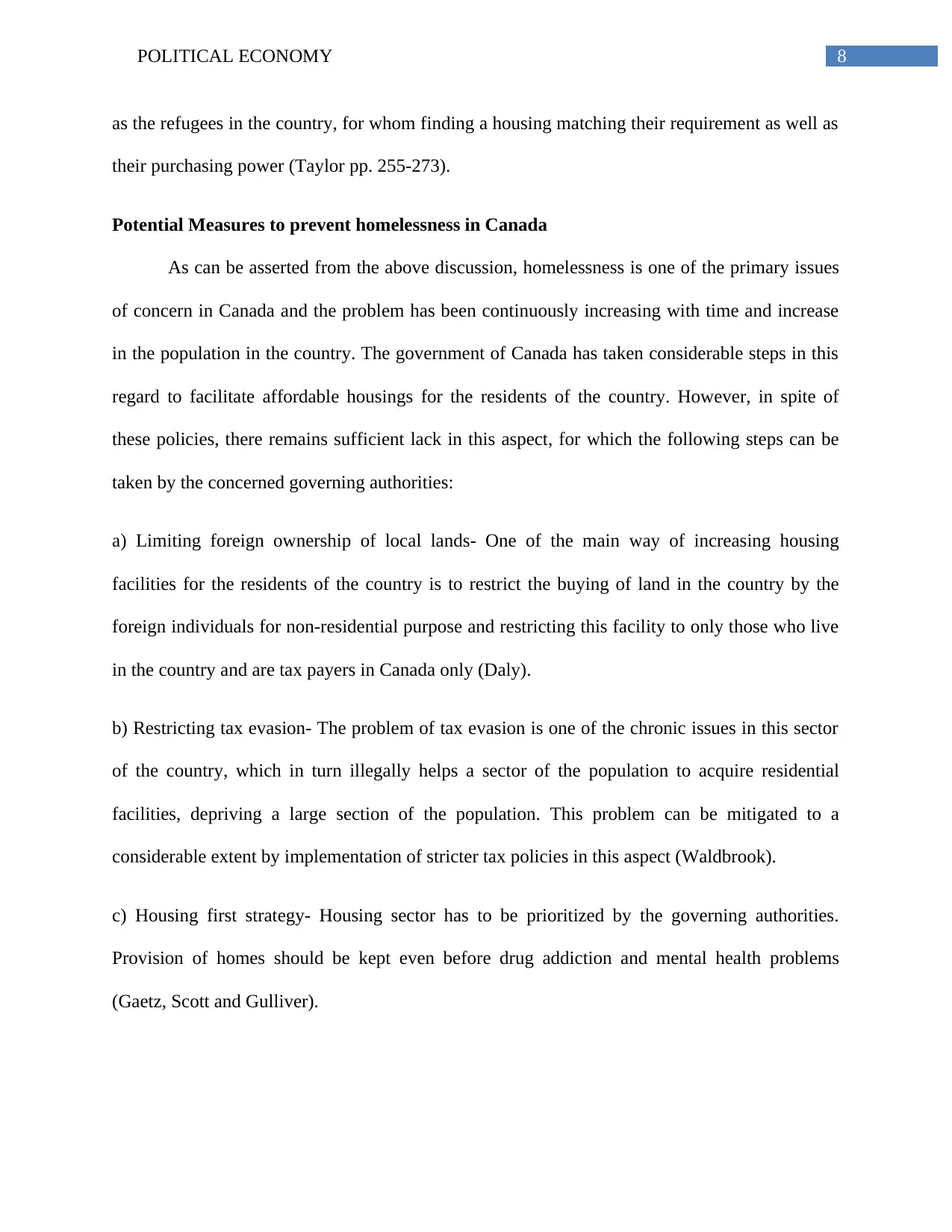
8POLITICAL ECONOMY
as the refugees in the country, for whom finding a housing matching their requirement as well as
their purchasing power (Taylor pp. 255-273).
Potential Measures to prevent homelessness in Canada
As can be asserted from the above discussion, homelessness is one of the primary issues
of concern in Canada and the problem has been continuously increasing with time and increase
in the population in the country. The government of Canada has taken considerable steps in this
regard to facilitate affordable housings for the residents of the country. However, in spite of
these policies, there remains sufficient lack in this aspect, for which the following steps can be
taken by the concerned governing authorities:
a) Limiting foreign ownership of local lands- One of the main way of increasing housing
facilities for the residents of the country is to restrict the buying of land in the country by the
foreign individuals for non-residential purpose and restricting this facility to only those who live
in the country and are tax payers in Canada only (Daly).
b) Restricting tax evasion- The problem of tax evasion is one of the chronic issues in this sector
of the country, which in turn illegally helps a sector of the population to acquire residential
facilities, depriving a large section of the population. This problem can be mitigated to a
considerable extent by implementation of stricter tax policies in this aspect (Waldbrook).
c) Housing first strategy- Housing sector has to be prioritized by the governing authorities.
Provision of homes should be kept even before drug addiction and mental health problems
(Gaetz, Scott and Gulliver).
as the refugees in the country, for whom finding a housing matching their requirement as well as
their purchasing power (Taylor pp. 255-273).
Potential Measures to prevent homelessness in Canada
As can be asserted from the above discussion, homelessness is one of the primary issues
of concern in Canada and the problem has been continuously increasing with time and increase
in the population in the country. The government of Canada has taken considerable steps in this
regard to facilitate affordable housings for the residents of the country. However, in spite of
these policies, there remains sufficient lack in this aspect, for which the following steps can be
taken by the concerned governing authorities:
a) Limiting foreign ownership of local lands- One of the main way of increasing housing
facilities for the residents of the country is to restrict the buying of land in the country by the
foreign individuals for non-residential purpose and restricting this facility to only those who live
in the country and are tax payers in Canada only (Daly).
b) Restricting tax evasion- The problem of tax evasion is one of the chronic issues in this sector
of the country, which in turn illegally helps a sector of the population to acquire residential
facilities, depriving a large section of the population. This problem can be mitigated to a
considerable extent by implementation of stricter tax policies in this aspect (Waldbrook).
c) Housing first strategy- Housing sector has to be prioritized by the governing authorities.
Provision of homes should be kept even before drug addiction and mental health problems
(Gaetz, Scott and Gulliver).
⊘ This is a preview!⊘
Do you want full access?
Subscribe today to unlock all pages.

Trusted by 1+ million students worldwide
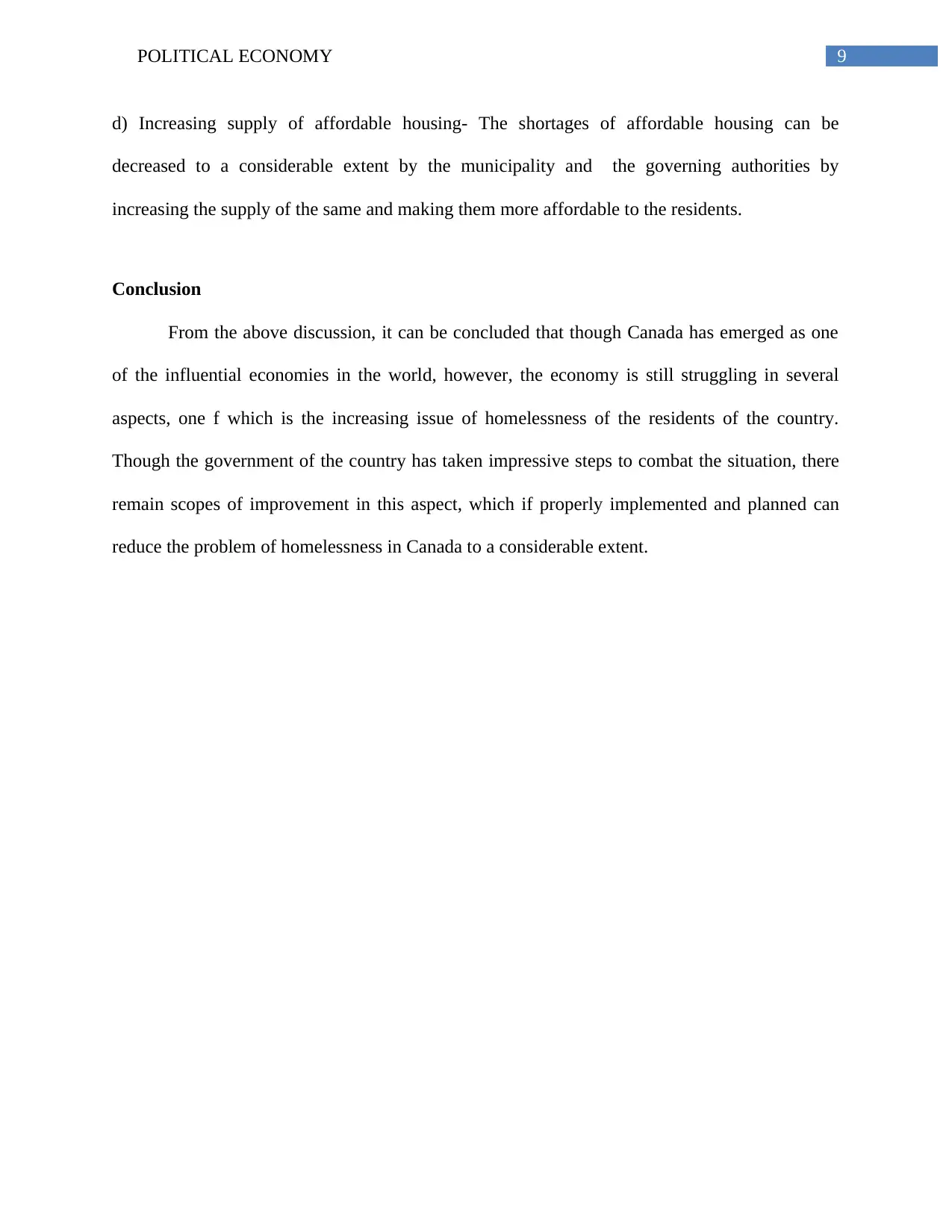
9POLITICAL ECONOMY
d) Increasing supply of affordable housing- The shortages of affordable housing can be
decreased to a considerable extent by the municipality and the governing authorities by
increasing the supply of the same and making them more affordable to the residents.
Conclusion
From the above discussion, it can be concluded that though Canada has emerged as one
of the influential economies in the world, however, the economy is still struggling in several
aspects, one f which is the increasing issue of homelessness of the residents of the country.
Though the government of the country has taken impressive steps to combat the situation, there
remain scopes of improvement in this aspect, which if properly implemented and planned can
reduce the problem of homelessness in Canada to a considerable extent.
d) Increasing supply of affordable housing- The shortages of affordable housing can be
decreased to a considerable extent by the municipality and the governing authorities by
increasing the supply of the same and making them more affordable to the residents.
Conclusion
From the above discussion, it can be concluded that though Canada has emerged as one
of the influential economies in the world, however, the economy is still struggling in several
aspects, one f which is the increasing issue of homelessness of the residents of the country.
Though the government of the country has taken impressive steps to combat the situation, there
remain scopes of improvement in this aspect, which if properly implemented and planned can
reduce the problem of homelessness in Canada to a considerable extent.
Paraphrase This Document
Need a fresh take? Get an instant paraphrase of this document with our AI Paraphraser
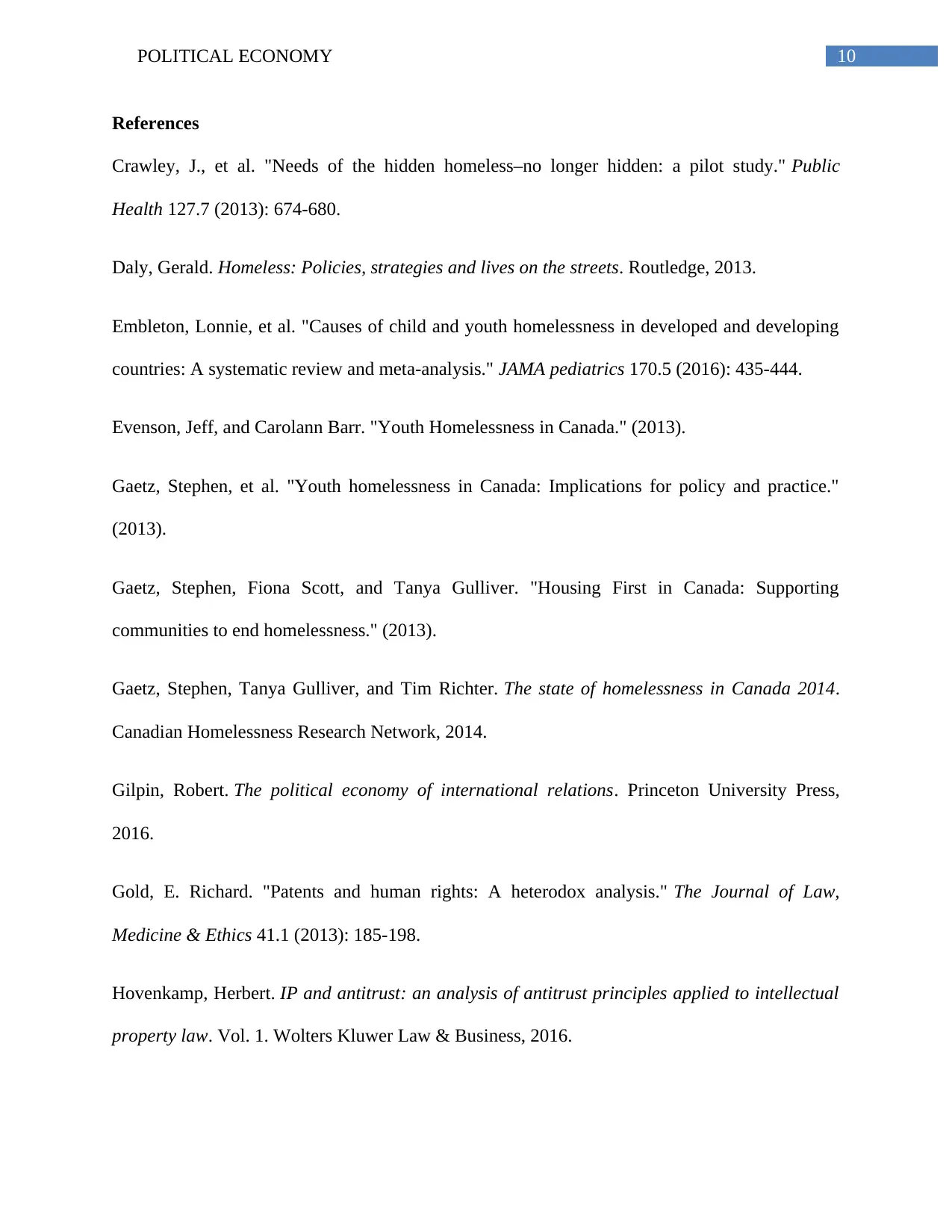
10POLITICAL ECONOMY
References
Crawley, J., et al. "Needs of the hidden homeless–no longer hidden: a pilot study." Public
Health 127.7 (2013): 674-680.
Daly, Gerald. Homeless: Policies, strategies and lives on the streets. Routledge, 2013.
Embleton, Lonnie, et al. "Causes of child and youth homelessness in developed and developing
countries: A systematic review and meta-analysis." JAMA pediatrics 170.5 (2016): 435-444.
Evenson, Jeff, and Carolann Barr. "Youth Homelessness in Canada." (2013).
Gaetz, Stephen, et al. "Youth homelessness in Canada: Implications for policy and practice."
(2013).
Gaetz, Stephen, Fiona Scott, and Tanya Gulliver. "Housing First in Canada: Supporting
communities to end homelessness." (2013).
Gaetz, Stephen, Tanya Gulliver, and Tim Richter. The state of homelessness in Canada 2014.
Canadian Homelessness Research Network, 2014.
Gilpin, Robert. The political economy of international relations. Princeton University Press,
2016.
Gold, E. Richard. "Patents and human rights: A heterodox analysis." The Journal of Law,
Medicine & Ethics 41.1 (2013): 185-198.
Hovenkamp, Herbert. IP and antitrust: an analysis of antitrust principles applied to intellectual
property law. Vol. 1. Wolters Kluwer Law & Business, 2016.
References
Crawley, J., et al. "Needs of the hidden homeless–no longer hidden: a pilot study." Public
Health 127.7 (2013): 674-680.
Daly, Gerald. Homeless: Policies, strategies and lives on the streets. Routledge, 2013.
Embleton, Lonnie, et al. "Causes of child and youth homelessness in developed and developing
countries: A systematic review and meta-analysis." JAMA pediatrics 170.5 (2016): 435-444.
Evenson, Jeff, and Carolann Barr. "Youth Homelessness in Canada." (2013).
Gaetz, Stephen, et al. "Youth homelessness in Canada: Implications for policy and practice."
(2013).
Gaetz, Stephen, Fiona Scott, and Tanya Gulliver. "Housing First in Canada: Supporting
communities to end homelessness." (2013).
Gaetz, Stephen, Tanya Gulliver, and Tim Richter. The state of homelessness in Canada 2014.
Canadian Homelessness Research Network, 2014.
Gilpin, Robert. The political economy of international relations. Princeton University Press,
2016.
Gold, E. Richard. "Patents and human rights: A heterodox analysis." The Journal of Law,
Medicine & Ethics 41.1 (2013): 185-198.
Hovenkamp, Herbert. IP and antitrust: an analysis of antitrust principles applied to intellectual
property law. Vol. 1. Wolters Kluwer Law & Business, 2016.
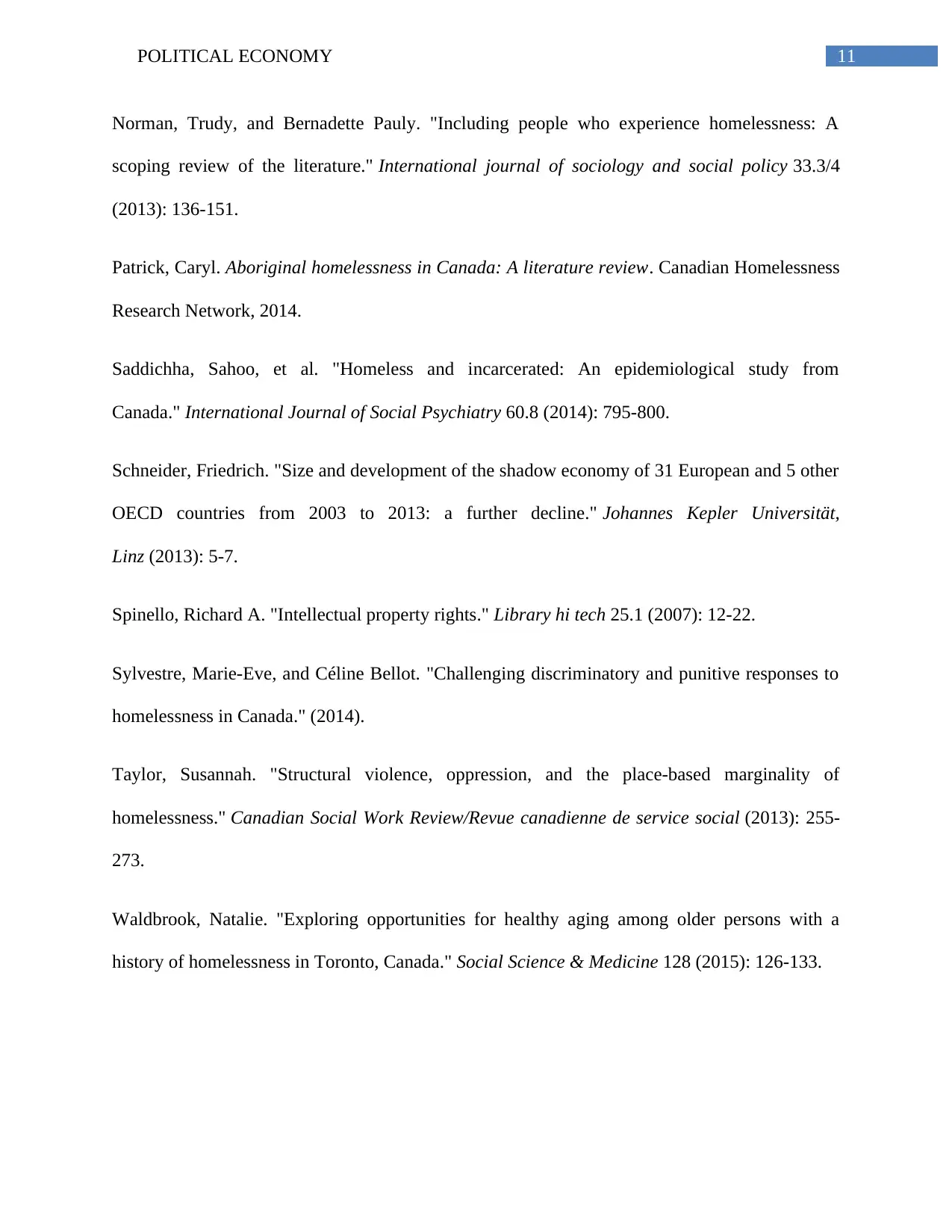
11POLITICAL ECONOMY
Norman, Trudy, and Bernadette Pauly. "Including people who experience homelessness: A
scoping review of the literature." International journal of sociology and social policy 33.3/4
(2013): 136-151.
Patrick, Caryl. Aboriginal homelessness in Canada: A literature review. Canadian Homelessness
Research Network, 2014.
Saddichha, Sahoo, et al. "Homeless and incarcerated: An epidemiological study from
Canada." International Journal of Social Psychiatry 60.8 (2014): 795-800.
Schneider, Friedrich. "Size and development of the shadow economy of 31 European and 5 other
OECD countries from 2003 to 2013: a further decline." Johannes Kepler Universität,
Linz (2013): 5-7.
Spinello, Richard A. "Intellectual property rights." Library hi tech 25.1 (2007): 12-22.
Sylvestre, Marie-Eve, and Céline Bellot. "Challenging discriminatory and punitive responses to
homelessness in Canada." (2014).
Taylor, Susannah. "Structural violence, oppression, and the place-based marginality of
homelessness." Canadian Social Work Review/Revue canadienne de service social (2013): 255-
273.
Waldbrook, Natalie. "Exploring opportunities for healthy aging among older persons with a
history of homelessness in Toronto, Canada." Social Science & Medicine 128 (2015): 126-133.
Norman, Trudy, and Bernadette Pauly. "Including people who experience homelessness: A
scoping review of the literature." International journal of sociology and social policy 33.3/4
(2013): 136-151.
Patrick, Caryl. Aboriginal homelessness in Canada: A literature review. Canadian Homelessness
Research Network, 2014.
Saddichha, Sahoo, et al. "Homeless and incarcerated: An epidemiological study from
Canada." International Journal of Social Psychiatry 60.8 (2014): 795-800.
Schneider, Friedrich. "Size and development of the shadow economy of 31 European and 5 other
OECD countries from 2003 to 2013: a further decline." Johannes Kepler Universität,
Linz (2013): 5-7.
Spinello, Richard A. "Intellectual property rights." Library hi tech 25.1 (2007): 12-22.
Sylvestre, Marie-Eve, and Céline Bellot. "Challenging discriminatory and punitive responses to
homelessness in Canada." (2014).
Taylor, Susannah. "Structural violence, oppression, and the place-based marginality of
homelessness." Canadian Social Work Review/Revue canadienne de service social (2013): 255-
273.
Waldbrook, Natalie. "Exploring opportunities for healthy aging among older persons with a
history of homelessness in Toronto, Canada." Social Science & Medicine 128 (2015): 126-133.
⊘ This is a preview!⊘
Do you want full access?
Subscribe today to unlock all pages.

Trusted by 1+ million students worldwide
1 out of 12
Related Documents
Your All-in-One AI-Powered Toolkit for Academic Success.
+13062052269
info@desklib.com
Available 24*7 on WhatsApp / Email
![[object Object]](/_next/static/media/star-bottom.7253800d.svg)
Unlock your academic potential
Copyright © 2020–2026 A2Z Services. All Rights Reserved. Developed and managed by ZUCOL.





